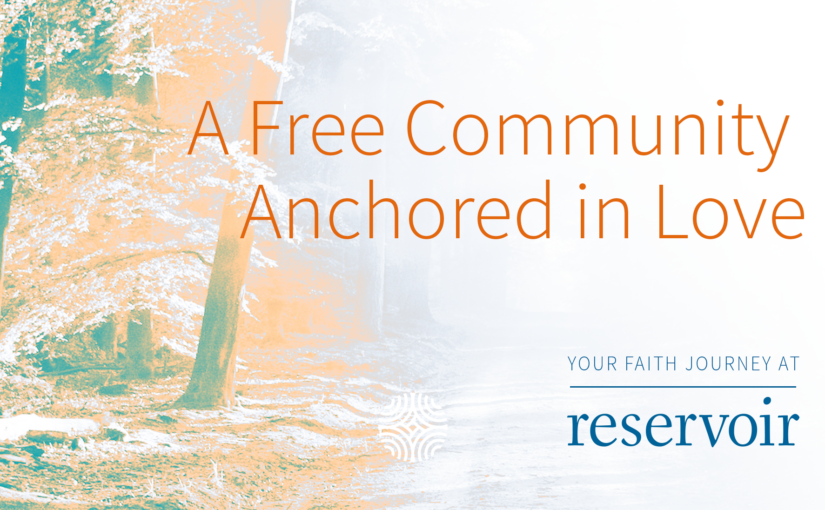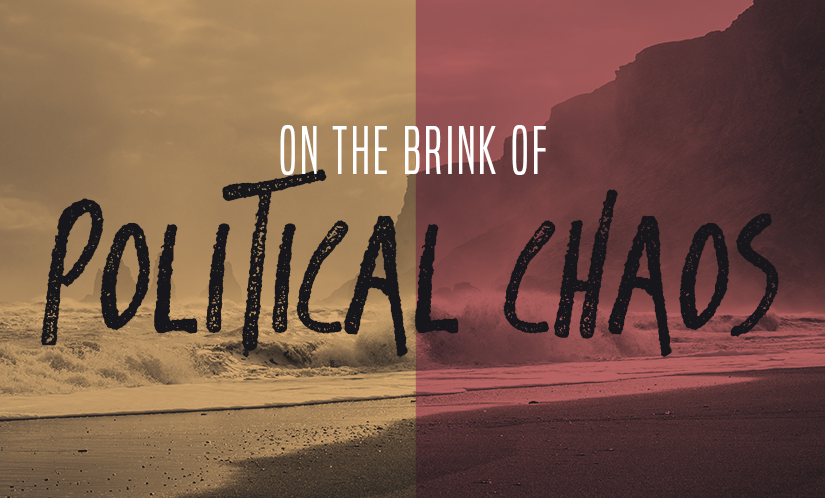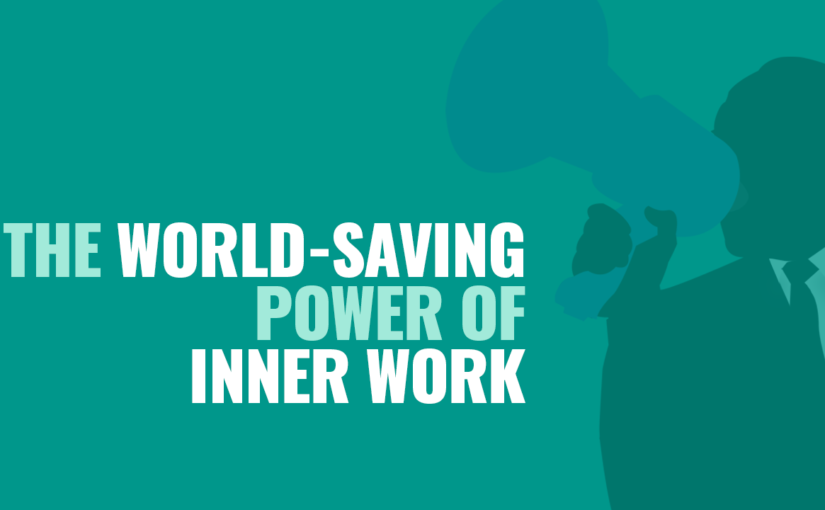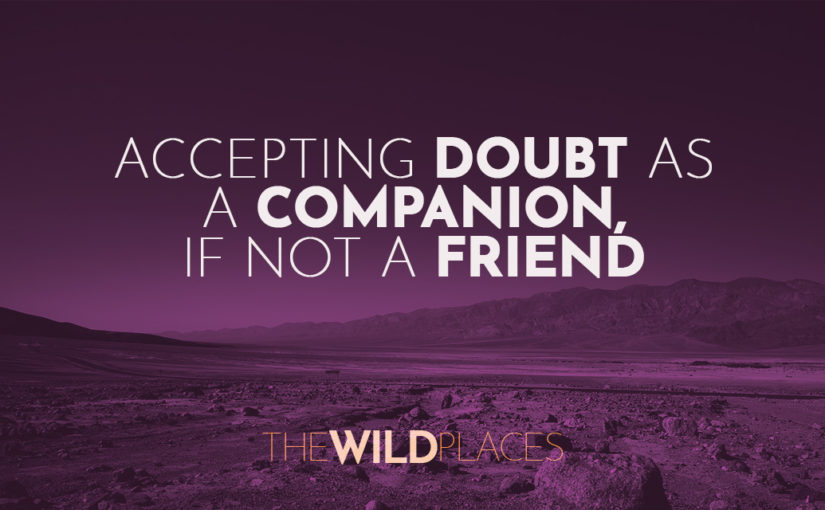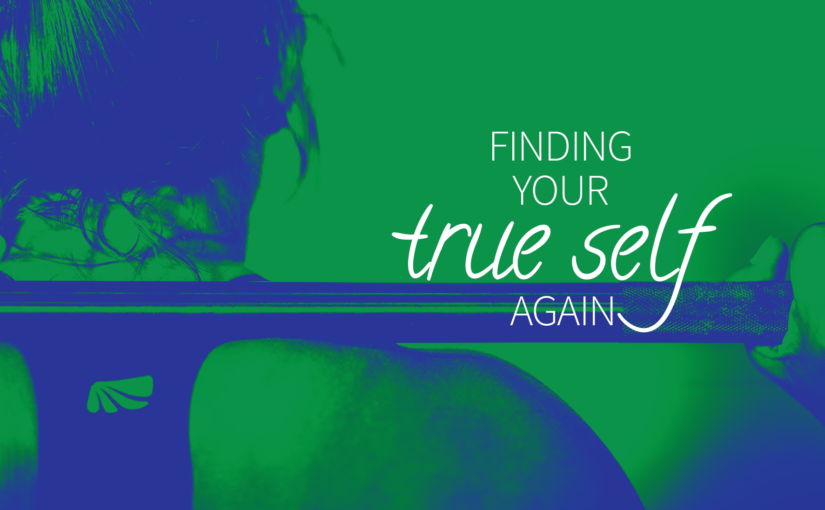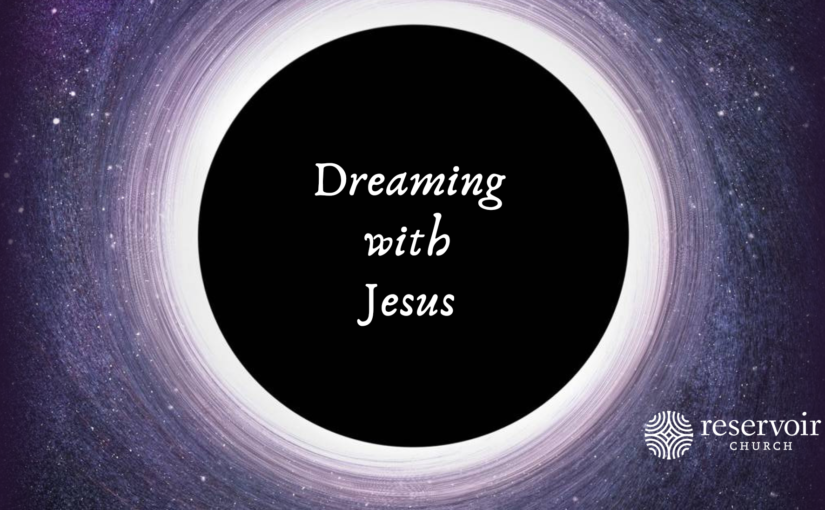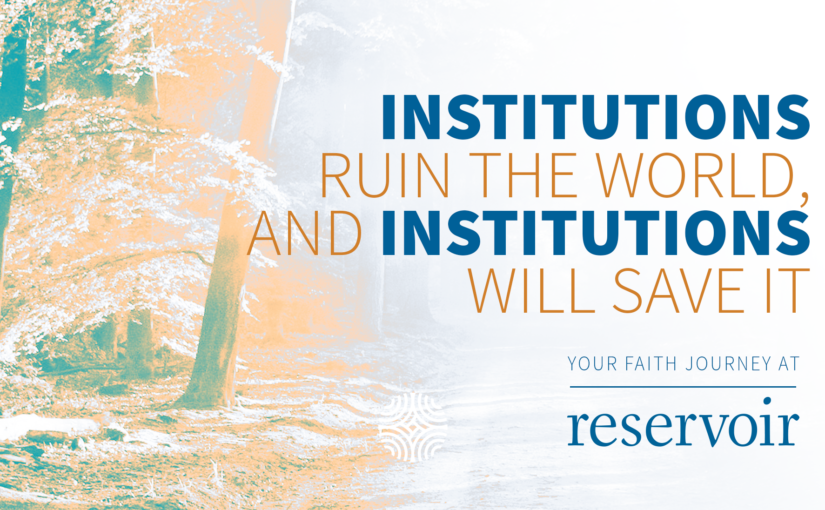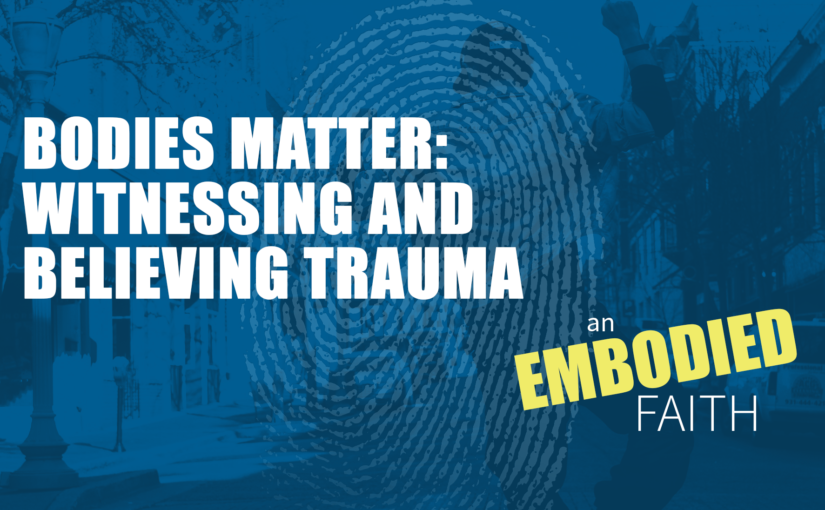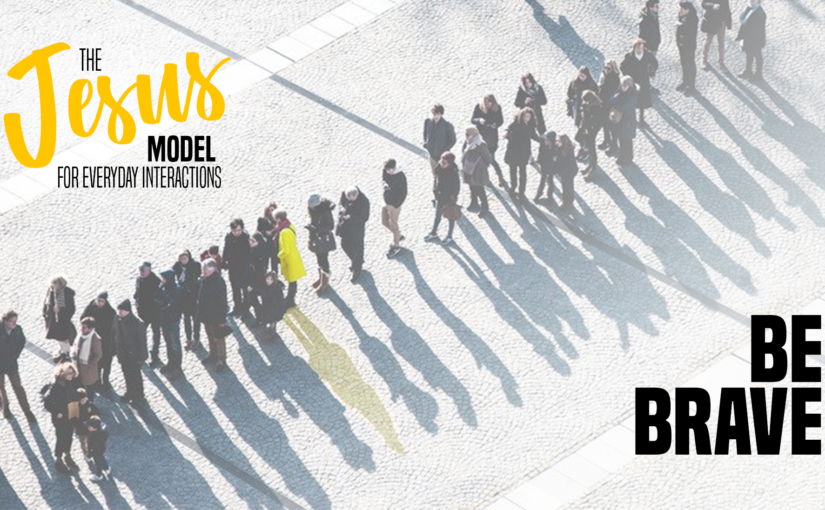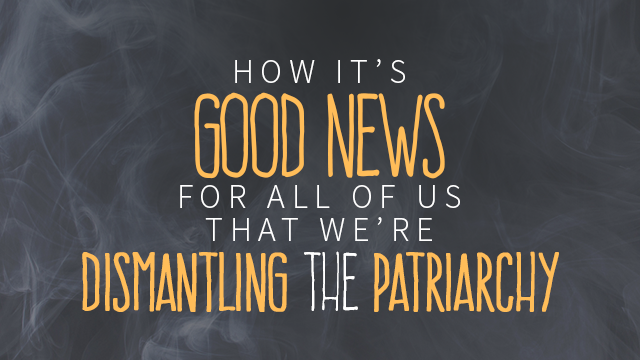Good Morning!
Today, I’d love to continue with insights we’ve been sharing in this sermon series, called Your Faith Journey at Reservoir. We’ve been highlighting our five core values – that make way for an open, Jesus-centered approach to your faith journey. These values; Connection, Action, Everyone, Freedom and Humility form the ethos of Reservoir – who we are and why/how we think about faith the way we do. We’ve realized that it’s worthwhile to be intentional each year to communicate this in a clear way – that doesn’t leave anyone wondering – if there is some “catch” attached or trade-off that’s required – to belong in this community.
Today we’ll take a closer look at the value of freedom. I’m eager to talk about freedom – not as a stand alone value, that we exercise to engage and showcase our own individualism – but one that orchestrates our deep connection to one another in community. I think freedom – at its most beautiful expression in a faith community – is not seen in us traveling down our own very distinct freedom paths – (what I believe, experience or know of God) – that never intersect with one another. I think freedom is what calls our paths to intersect – to collaborate – to learn from one another and move forward in this world together.
Our individual freedom is necessary to a vibrant and healthy experience of faith – but it benefits from being situated in relationship with others, even if the freedom expressed by others is strikingly different than our own…
….and the only way to do this is to be anchored in a unifying, divine source of love – which we find in Jesus.
I’ve come to believe that Jesus alone is perfect theology (hat tip to Brad Jersack)- Period. The way I think about and approach the Bible, or prayer, or community – all flow from Jesus. I’m being reverent here. As a pastor of this community – I hope to communicate that at a baseline – life with Jesus at the center is really, really good news. It’s why we’ve taken time to define our values the way we do – and why we define freedom here at Reservoir as: “honest exploration of faith over conformity of belief or behavior, trusting that the Holy Spirit reveals truth to all who seek God.”
Freedom is a value that we encourage here at Reservoir NOT ONLY because it allows us movement toward Jesus – BUT because it also CALLS us to be an active participant in keeping ACCESS to JESUS, FREE AND CLEAR FOR ALL without hindrance – and this means that even our freedom can’t overtake someone else’s view of Jesus.
Over the last month or so we’ve queried our community groups – to give voice to where and how they’ve found Jesus to be good and real in their lives…. And how Reservoir has helped facilitate the experience of the love of Jesus. And out of this process has come deep, deep insight and wisdom, the greatest theme being that people experience the love of Jesus …..through BAGELS… (I’m not joking). Sesame bagels, everything bagels, chocolate chip bagels – they are all mentioned…many, many times.
And second to the holy wonder of bagels were themes that hit at all of the 5 core values we’ve been talking about. And the table that I sat at expressed their thoughts by saying,
“What we feel is that Reservoir seems committed to the struggle of keeping the widest most open doors possible. Our church is willing to sit in risk and vulnerability and open belief statements such as ‘we don’t know,’ or ‘what do you think?’ All of this leads to a room full of FREE, diverse people where love thrives in the multiplicity of human beings and all they bring to the community.”
I think, “Oh my goodness that’s so beautiful” … and simultaneously, “Aaah, Here is where freedom gets real and messy and gritty – as we actually live it out alongside one another…” Here is where freedom shows the prowess of its value…the complexity of it – because IT IS A STRUGGLE my friends to uphold freedom, the widest doors possible – WITH JESUS SMACK DAB IN THE CENTER _ alongside values of humility, alongside a value of connection, alongside the value of everyone – and REALLY mean it. It takes risk, and vulnerability and trust of the whole community.
And as much as we regard Freedom as a powerful means for individual rights- when this value is found in the context of a faith community – it demands a higher standard – it demands a higher centering than our self wants or needs or perception – and that is the standard of love, found in Jesus.
Both of my parents became followers of Jesus, when my mom was pregnant with me.
The “good news” came to them through a traveling gospel salesman who came on foot – and knocked on their door and “Led them to the Lord,” as they say.
I was born into a community of faith that had found its legs in legalism, setting deep grooves of expected adherence to belief, Bible, prayer, behavior, dress …. but never spoken of course – on those terms – but spoken in terms of love and freedom in Jesus.
It was expected that kids sit through all services, there were many services – and they were often (very) LONG! And at the age of 5 or 6, myself and a friend – drew up a survival plan – which was to diligently find in our Bibles – every scripture that was referenced in the sermon – and copy it down as fast as possible – verse by verse… before the next one was mentioned! My favorite scripture for a long time was the story in Matthew ….”where Jesus calls a little child to him, and then said to those around him, “Truly I tell you, unless you change and become like a child, you will never enter the kingdom of heaven. If anyone causes one of these kids to stumble, it would be better for them to have a large millstone hung around their neck and to be drowned in the depths of the sea.” [taken from Matthew 18:5-6]
I LOVED that scripture! 🙂
I would use that scripture anytime I could at home – especially when I felt like my rights – my freedom was getting stepped on by my parents. Which – of course as a child was ALL THE TIME.
I wouldn’t understand for many years how this unassuming method of utilizing scripture to make it through a boring service was maybe less my unique individualism at play, and more an absorption of compliant behavior I understood of my environs. Scripture would prove to be an effective mode in my faith journey – by which I would learn to follow the prescription to my “goodness”/my holiness – which could then lead to my experience of Freedom in Jesus.
Throughout the history of American society we see these great markers of power and freedom – that may for equality and brought to light injustice:
Starting with the Declaration of Independence
The Bill of Rights
The Abolition of Slavery
The Era of Immigration “learning to breathe free,” from 1880 – 1920
The 19th Amendment that gave women the right to vote
The Civil Rights Act 1964
2015 – Supreme Court decision for same-sex couples to marry.
Nestled in these historical moments is ‘freedom’ born out of community. A communal voice expressed – of human beings valuing connection to one another that is unified by a hope and a dream to “change the world‘: to create a new society, to make a better life for everyone…. And somehow through communal effort – change is effected.
(And sure, we are revisiting some of these freedom moments and finding problems that require us to go back to the patriarchal systems and structures they were born out of – we need to critically engage – and move forward with new ideas.)
I think the same can be said at times of faith communities, that there is a deep communal bond that allows the church the freedom to be and become – The freedom to collectively create an ever-evolving body or church, a new kin-dom of God here and now.
But we also know – from history and experience – that freedom is not always easy to navigate, doesn’t always bubble up as a widespread, agreed upon value, and is often met with struggle and resistance.
And to add to that struggle is the subtle, shifting definition of freedom over time.
Brad Jersack the author of “A More Christ-Like God” (a book we read as a staff), says that freedom has moved in American culture to be defined by society as “Getting what I want, by doing what I want”– but has shifted even more so, in the last 20 years toward “keeping what I have – by doing what I must.” This definition relays a more defensive stance – a guarding and a protective stance – and one that has taken up greater claim. And it’s hard when we feel like our freedom – our rights- or our security is threatened. It calls up in us that need to defend and guard freedom – often vehemently in Jesus’ very name.
As a young, young child I was taught just how great God’s love for me was – how grateful and thankful I should be for such a display of this expansive display of love – especially for someone like me who didn’t deserve it. The greatest thing I could do to touch or honor such love – was to adhere, comply, obey the beliefs that my community purported of God. My own worth and belonging in this faith journey depended on my firm grasp, the ability to articulate…to defend my faith, and uphold this great God against inevitable attacks.
As I mentioned I took to scribing all the scriptures spoken in service – and as I mentioned so many of these services went really long. My Dad was a deacon and I helped him often set up the metal, folding chairs at the back of the room where the overflow, the “latecomers” would sit. It was also where we sat, because we were humble servants of the Lord.
On one of those evenings, I was close to finishing copying the Scripture into my little book – the one I loved to take to school the next day and read to people, (because I took it as my role to grow the field of Jesus followers single-handedly). But I was also battling my need to go to the bathroom. I was trying so hard to get those last few verses to paper – AFRAID that if I left for the bathroom, I would surely miss the next Bible reference….and so I stood my ground, I didn’t move. I didn’t make it to the bathroom. I peed in the folding chair. (Which is VERY noticeable by the way, when it’s a metal chair, and you have to fold it up and walk it to the stack of chairs in the corner of the room).
Sorry if that story was T.M.I. (too much information!)
It’s a memory that wouldn’t let go of me as I was framing this sermon – sometimes the littlest of moments, the smallest of memories – hold the deepest truths. This deep truth still lives in my body: that at the age of 6 years old, I was in an environment of faith where I really wasn’t free. I was anxiety-ridden, nervous, fearful. And the container of my experience of faith was hinged on “power,” not love. The focus was compliance and control of belief and behavior.
Where compliance is heralded – anxiety and fear reign.
Compliance: Comply to the behavior expected – ex/ Don’t get up in service. Learn all the scripture you can (this is critical), because…
Anxiety: If you don’t have all the scripture written down – you will be ill-equipped the next day at school. This woul be unfortunate because you need to make sure everyone else knows the prescription of holiness to get to God. A pervasive tone of anxiety of whether I was taking in or doing enough. Was I enough?
Fear to move: I was literally unwilling to move, driven by fear. For me it manifested in a physical manner. But maybe you can see the more universal commonality here in this small story – that plays out in broader strokes around you. Of how the need to “stick and defend your ground, at all costs,” becomes the standard of belonging. Of how the capacity to be unwavering, immoveable is somehow a sign of taking your freedom and love of Jesus seriously.
In this pursuit of freedom – where a defensive and protective stance is taken up – and anxiety and fear reign as the contributing forces, we often end up separating from community, losing sight of our bonding VISION (of JESUS)… AND even within our communities we categorize who’s “in” or “out”… who’s against “us” or with “us”… those who aren’t deemed as “with us” – who might approach God differently – or interpret the Bible in a “wrong” way – or just display too much difference. In an effort to ensure their compliant behavior and get them “back on track” – we end up stepping on their “rights and freedoms and violate their peace and security” (Jersack, 52). When we craft a road to freedom that rests on self-will and preservation, it craves mastery and power.
Jesus and his apostles thankfully give us a different definition of freedom – a freedom that doesn’t require any defending – and is found in Jesus, his very body.
Let’s read Paul’s words in Ephesians, found on your program:
Ephesians 4:1-6, 15, 16 (CEB)
1Therefore, as a prisoner for the Lord, I encourage you to live as people worthy of the call you received from God. 2 Conduct yourselves with all humility, gentleness, and patience. Accept each other with love, 3 and make an effort to preserve the unity of the Spirit with the peace that ties you together. 4 You are one body and one spirit, just as God also called you in one hope. 5 There is one Lord, one faith, one baptism, 6 and one God and Father of all, who is over all, through all, and in all.
“..by speaking the truth with love, let’s grow in every way into Christ, 16 who is the head. The whole body grows from him, as it is joined and held together by all the supporting ligaments. The body makes itself grow in that it builds itself up with love as each one does its part”.
Paul writes from prison to the church of Ephesus. He speaks of this “one-ness of God” – at first this can sound incredibly exclusionary, not a field for honest exploration. ONE way, one faith, one track – play into the defensive posture people are inclined to take? Maybe at first blush.
But Paul is actually communicating something quite different – quite freeing – God has soaked the world with GOD’s self – there is one-ness throughout all the rituals, the path, the cultures, the differences… God is in the cosmos – throughout every human heart – one-ness is already there… the love of God.
This message, for this community of Ephesus is radical for the 1st century. “BE FREE”!
EVERYONE – Jew or Gentile – circumcised or uncircumcised – wealthy or poor, it doesn’t matter who your mother is, or what your blood is, conservative or liberal- you are welcome with freedom to orient to God – and HE’S pretty clear right – not from separate silos – but from an integrated, functioning, interdependent, collaborative community. This is a radical picture of human family – 2,000 years ago and (my!), isn’t it still radical today? (Reference: Alexander Shaia)
Paul says, “The body makes itself grow in that it builds itself up with love – as each one does its part.” …AS EACH of us do our part…WITH FREEDOM from anxiety, with freedom from judgment. God is the head. God is not asking us to be the head. God is not asking us to be God. God is asking us to be who we ARE – the elbow, the shin, the earlobe. BE THAT! Because God sent JESUS to help us to be HUMAN – to engage our full human bodies on this earth. To greet other human beings on this earth – with humility, gentleness and patience… NOT to ensure that we ourselves, or those around us achieve the holiness of GOD.
When we veer toward setting moral codes as the standard for freedom, it actually becomes a tool of dismemberment.
It creates a sick, toxic body – with tools of shame and judgment as the method of control and mastery. The “most, wide-open doors” – the doors that say “Everyone is welcome with freedom” above them – becomes but a pinhole by which moral approval is the key to enter.
The role of being “Moral approver” makes us so tired and weary. So much energy is used in surveying the border -securing the border of our faith – demanding proof from people – “show me your papers” – the credentials of how you are a follower of Jesus or not? WE start patrolling each other’s behavior and narrowing the expanse of “one-ness” and mislabeling “Freedom.” One-ness starts to be defined as preserving a set of conforming beliefs, versus as it says in this scripture, preserving the unity of the Spirit with treasured diversity. This is not freedom, it’s bondage. We forget that Freedom is love – not power to control.
The gospel – this good news of Jesus – transcends moral approval as the basis for acceptance, belonging, or unity in the Spirit. The good news – the love of Jesus is FREEDOM.
As a follower of Jesus – I can see that it is not my role, it is not upholding the value of freedom to give, demand or receive moral approval from another – that’s serving self-interests, that’s feeding my own anxiety – and dismembering the unity of the body of Christ.
Often Paul’s words here in Ephesians – are helpful in thinking about how to navigate conflict and get along – AND I think Paul is ALSO reminding us – that Jesus is the center of our lives – all of our lives, and that center is LOVE.
And that love is generative beyond our construction. It multiplies in community, it grows. That love is binding, that love breaks apart moral exoskeleton’s that we try to prop ourselves up on.
…and this love calls us to work…..it calls us to hard work.
It’s not lost on me that Paul uses this image of a body as metaphor for a functioning, healthy community. Because a physical body moves when it’s healthy, and a community of faith, anchored in the oneness of the Spirit of God is also called to motion.
When we work for the values of everyone, freedom, connection, diversity and authenticity, humility to be upheld… there will always be work to do – to keep us moving forward.
There is no standing still in “oneness.”
We value love, relationship, intimacy that safe-keeps (not guards!), our own free view and relationship with Jesus.
And we value with TRUE freedom our zesty voices and perspectives – and we TRUST THAT GOD doesn’t need defending, and that God can SPEAK for GOD’s(her)- self.
MANNA Community
To honestly explore – and experience God, with freedom – from our own unique vantage point. A God who is completely loving – whose nature is pure goodness – gives us the capacity to emulate God by exemplifying love.
Last week I had the honor to hear from someone whose work and calling exemplifies LOVE, the chaplain of the MANNA community, a ministry of, and with, the homeless community in downtown Boston.
MANNA’s mission is not only to welcome folks across differences of class, wealth, culture, race and mental ability, but to empower all people to claim their place as essential members of the community. MANNA believes that everyone has gifts to give and to receive. (https://www.stpaulboston.org/manna)
And that there’s a need – a deep soul need – of each other to function in this relational way. This community gathers each week to serve, to pray, and to create together.
This chaplain that I was talking to – runs The CoffeeKlatsch a community that gathers for an hour on Sunday mornings, to connect over the realities of their lives – the extreme adversity they face on the streets and to find hope in connection with one another. It is open and honest conversation – which with all the diversity in the space often results in very opinionated/very BIG – robust conversations. Conversations that are offensive and just generally very hard.
I asked this chaplain – HOW do you do this? HOw do you hold space for this? In a way that freedom is upheld – the right to act/say/believe what you have – and have an eye for the community…? In a way that keeps it moving? Functioning?
First she said, “Well we have two ground rules:”
- “No violence or harm done to another.
- “Can’t be high or drunk when engaged in the community.”
Pretty important rules.
The chaplain then added that she and her colleagues operate on this guiding principle – this word, “remain.”
Listening more as she spoke, I realized it’s similar to what the love of God facilitates here at Reservoir – that to “remain” in the love of God, allows MANNA to honor the freedom and integrity of everyone who walks through their doors.
That MANNA too, remains committed to the struggle of keeping the widest most open doors possible.
They remain committed to the mission – this unifying spirit… that there’s an essential part for everyone to play in this greater community.
And they remain in the posture of welcome – for anyone and everyone.
Even if they pee in a chair.
This word “remain” spoke to me of such sincere love. Love at the heart of this MANNA community – and maybe the heart of all communities that move and greet this world with all that it presents – even if we feel , experience it – or see it differently than someone else – EVEN if what it is – is God.
I John 4:11-13 (CEB)
11 My dear friends, if God loved us this way, we also ought to love each other. 12 No one has ever seen God [comment: NO ONE can put a stake or a claim or a border around GOD]. If we love each other, God remains in us and God’s love is made perfect in us. [comment: we don’t need to strive for ‘holiness” (or some external standard] 13 This is how we know we remain in God and God remains in us, because God has given us a measure of the Spirit.
How do we uphold FREEDOM, with difference – and with an eye toward community?
WE REMAIN – WE REMAIN – WE REMAIN in God’s LOVE.
This is our guiding principle too. This LOVE of God, this pure view of God – IF anything, is what we get to safe-keep.
Freedom is not found in organization structures or external expectations, but rather is found in centering the shared life and love with Jesus in community.
Perhaps the ground rules of MANNA are similar to ours too –
- No violence/harm to one another – and by violence I mean in exercising your own freedom – you must have an eye to whether or not you are “violating the identity and integrity of another person.” (taken from Parker Palmer, A Hidden Wholeness)
- And a commitment to being aware of when we veer toward fixing, saving, advising or rescuing someone else. To recognize we are entering territory that might not be ours to walk through. (We can listen and ask honest and open questions).
Our role is to:
- LET GOD be GOD.
-
- Take seriously our freedom to explore who God is to us.
- Take seriously our freedom as it fits in the body – the whole of community.
- GIVE THE HOLY SPIRIT her rightful PLACE to reveal all she hopes to reveal to you and those around you.
Invitation to Whole Life Flourishing:
Look for opportunities to express freedom in your daily life, with a leaning toward others, taking on a generous and self-giving posture (of humility, patience and gentleness) in your heart and actions.
Spiritual Practice:
Ask God this week to help you notice where your freedom intersects with others around you? Reflect on whether this intersection hinders access to Jesus, or makes way for the widest, most open doors to Jesus.
Would you join us in being COMMITTED TO THE STRUGGLE of MAKING THE WIDEST, MOST OPEN DOORS POSSIBLE?


